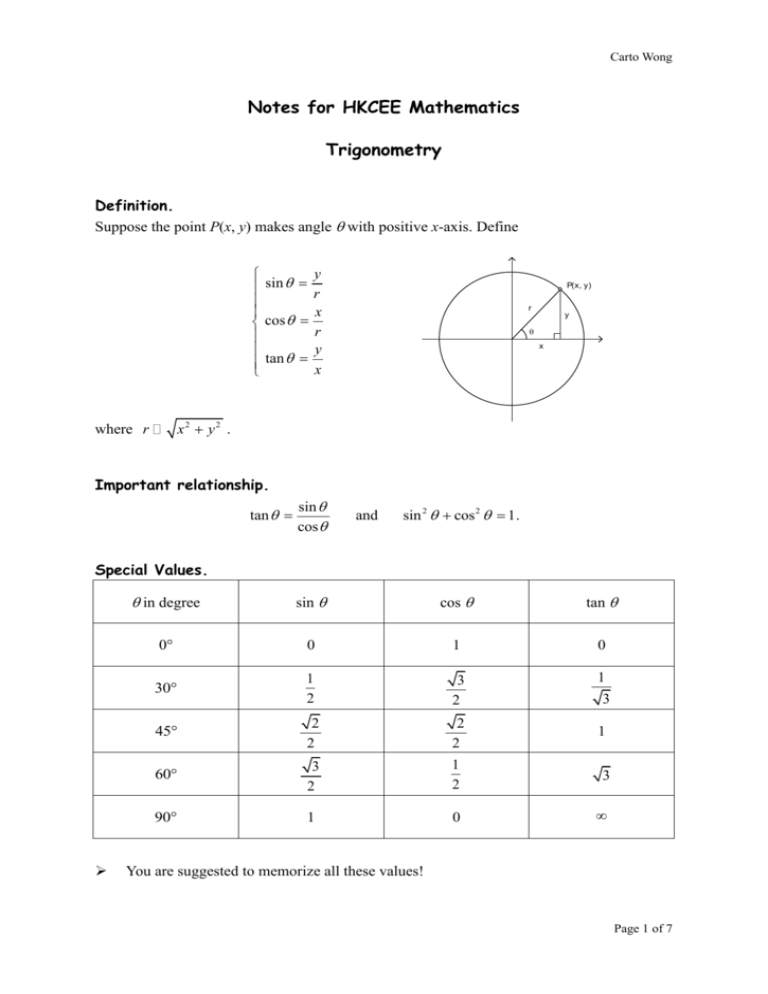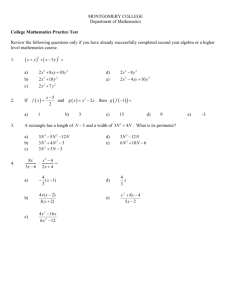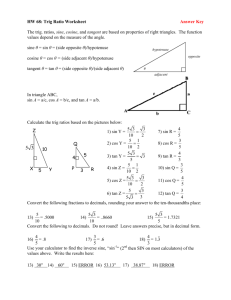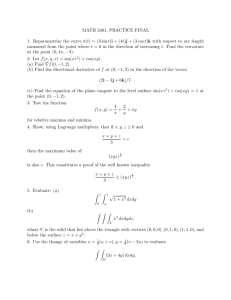15. Trigonometry, suitable for HKCEE
advertisement

Carto Wong Notes for HKCEE Mathematics Trigonometry Definition. Suppose the point P(x, y) makes angle with positive x-axis. Define y sin r x cos r y tan x P(x, y) r y x x2 y 2 . where r Important relationship. tan sin cos and sin 2 cos 2 1 . Special Values. in degree sin cos tan 0 0 1 0 30 1 2 3 2 1 45 2 2 2 2 1 60 3 2 1 2 3 90 1 0 3 You are suggested to memorize all these values! Page 1 of 7 Carto Wong The Graphs of Trigonometric Functions. The Graph of Sine Function - 360 o - 180 o 180 o T h eG r a p oh f C o s i nFeu n c t i o n 360 o o - 3 6 0 1 8 o0 3 6 o0 The functions sin and cos are periodic with period 360 . The Graph of Tangent - 180 o - 1 8 0 o - 90 Function o 90 o 180 o The function tan is periodic with period 180 . General Solution for Trigonometric Equation. Equation General Solution sin k n 180 (1)n sin 1 k cos k n 360 cos 1 k tan k n 180 tan 1 k Example. The general solution for sin 1 is n 180 (1)n 30 (n is integer), i.e. the 2 solutions are , 330, 210, 30, 150, 390, 510, Page 2 of 7 Carto Wong Reduction Principle. tan( ) tan sin( ) sin cos( ) cos sin(90 ) cos cos(90 ) sin tan(90 ) sin(90 ) cos cos(90 ) sin tan(90 ) sin(180 ) sin cos(180 ) cos tan(180 ) tan sin(180 ) sin cos(180 ) cos tan(180 ) tan sin(270 ) cos cos(270 ) sin tan(270 ) sin(270 ) cos cos(270 ) sin tan(270 ) sin(360 ) sin cos(360 ) cos tan(360 ) tan 1 tan 1 tan 1 tan 1 tan The figure as shown will help us to memorize the above properties. S A T C A Notations. Given a triangle ABC, the length of BC, CA, AB are denoted by a, b, c respectively as shown in the figure. The letter R usually stands for circumradius(外接圓半徑). c B R b C a Area of Triangle. area of ABC 1 1 1 ab sin C bc sin A ca sin B . 2 2 2 A Try to prove this formula yourself! A hint is given by the figure on the right. h B D C Page 3 of 7 Carto Wong Sine Law. With the notations above, we have a b c sin A sin B sin C ( 2 R) . Proof I. Just note that follows that 1 1 a c ab sin C area of ABC bc sin A a sin C c sin A . It 2 2 sin A sin C a b c by symmetry. sin A sin B sin C Proof II. Let O be the circumcenter(外心)of ABC and BO meets the circumcircle(外接圓)at D. A D Note that BCD is a right angle triangle, so sin A sin D Hence, O B BC a . BD 2 R C a b c 2 R and follows that 2 R by symmetry. sin A sin B sin C Applications of Sine Law. Example 1. Given a triangle ABC with A 40 , B 80 , and CA = 4.33 cm. Find the length of BC. Solution. By Sine Law, a b sin A sin B a 4.33 sin 40 sin 80 4.33 a sin 40 sin 80 a 2.83 cm (correct to 2 d.p.) A 40 o 4.33 cm 80 B o C This is typical case. In the examination, C is usually given instead of B . In this case you can find B (by sum of triangle) first and then apply Sine Law. Page 4 of 7 Carto Wong Example 2. Given a triangle ABC with A 40 , BC = 2.83 cm, and CA = 4.33 cm. Find B correct to nearest degree. Solution. BC CA sin A sin B 2.83 4.33 sin 40 sin B 4.33 sin B sin 40 2.83 sin B 0.9835 Hence, B 80 or 100 (correct to nearest degree). The situations are shown in the following figures. A 40 A 40 o o 4.33 c m 4.33 cm B TIP. 2.83 cm C B 2.83 c m C In order to get a more accurate answer, it is better to compute (by your calculator) 4.33 sin 1 sin 40 but not sin 1 0.9835 . 2.83 Cosine Law. With the usual notations, cos A b2 c2 a 2 2bc cos B c2 a 2 b2 2ca cos C a 2 b2 c2 2ab Similarly, Page 5 of 7 Carto Wong Applications of Cosine Law. Example 3. A triangle ABC is shown in the following figure. Find B . A 4 cm 2 cm 3 cm B C Solution. 22 32 42 2 23 1 cos B 4 B 104.48 (correct to 2 d.p.) cos B Example 4. Find the length of CA in the following figure. A 2.43 cm 60 B o 3.72 cm C Solution. 2.432 3.722 CA2 2 2.43 3.72 2 CA 10.7037 cos 60 CA 3.27 cm (correct to 2 d.p.) Example 3 and example 4 are typical applications of Cosine Law. Roughly speaking, these are the only two cases for which we use Cosine Law. All the questions in HKCEE, except these 2 types, can be solved by Sine Law. We see one more example. Page 6 of 7 Carto Wong Example 5. Find the length of BC in the following figure. A 2.43 cm 60 3.27 cm o B 40 o C Comment. The easiest method is to find A first and then apply Sine Law. But I want to introduce you a corollary of Cosine Law: a b cos C c cos B . Solution. Using the formula above, BC 3.27 cos 40 2.43 cos 60 3.72 cm (correct to 2 d.p.) . The formula a b cos C c cos B is out-of-syllabus. It can be used in MC only. In example 5, the given conditions are redundant(過多的). If the length of AB (or CA) is not given, the question is still solvable. Let us end the discussion by IQ Question. Simplify sin x . n Page 7 of 7





